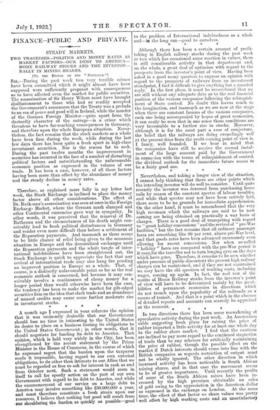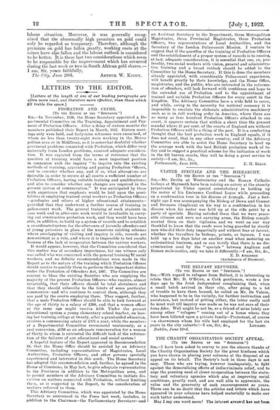FINANCE-PUBLIC AND PRIVATE.
STEADY MARKETS.
TWO TRAGEDIES—POLITICS AND MONEY RATES AS MARKET FACTORS—OUR DEBT TO AMERICA— HOME RAILWAY STOCKS AND THE INVESTOR- ' RALLY IN MINING SHARES.
[To THE EDITOR OP THE " SPECT/ITOR."3 Slit,-DUIllig the past week two very terrible crimes have been committed which it might almost have been supposed were sufficiently pregnant with consequences as to have affected even the market for public securities. The assassination of Sir Henry Wilson must have brought disillusionment to those who had so readily accepted the Government's assurances that the Treaty was a prelude to an era of peace and good will in Ireland, while the murder of the German Foreign Minister—quite apart from the dastardly character of the outrage—is a crime which threatens to have far-reaching consequences in Germany, and therefore upon the whole European situation. Never- theless, the fact remains that the stock markets as a whole have been firm during the week, while during the last few days there has been quite a fresh spurt in high-class investment securities. Nor is the reason far to seek. During the past twelve months the improvement in securities has occurred in the face of a number of disturbing political factors and notwithstanding the unfavourable economic position as expressed in the volume of our trade. It has been a case, however, of all these factors having been more than offset by the abundance of money and the steady decline in money rates.
* * * Therefore, as explained more fully in my letter last week, the Stock Exchange is inclined to place the money factor above all other considerations. The effect of Dr. Rathenau's assassination was seen at once in the Foreign Exchange Market, where the German mark slumped and other Continental currencies gave way in sympathy. In other words, it was perceived that the removal of Dr. Rathenau and the circumstances of his death might con- ceivably lead to fresh political disturbances in Germany and render even more difficult than before a settlement of the Reparation payments. And inasmuch as there seems to be little chance of relief being given to the economic situation in Europe and the demoralized exchanges until the Reparation payments and the whole tangle of inter- national indebtedness have been straightened out, the Stock Exchange is quick to appreciate the fact that any revival of international trade may also hang fire pending an improved position in Europe as a whole. That, of course, is a distinctly unfavourable point so far as the real economic outlook is concerned, but because it may con- ceivably involve a continuance of cheap money for a longer period than would otherwise have been the case, the tendency has been to make the market for gilt-edged securities firm on the idea that slack trade and an abundance of unused credits may cause some further moderate rise in investment stocks.
A month ago I expressed in your columns the opinion that it was eminently desirable that our Government should lose no time in intimating to the United States its desire to place on a business footing its obligations to the United States Government ; in other words, that it should negotiate for funding its debt to America. That opinion, which is held very widely in the City, has been strengthened by the recent statement by the Prime Minister in the House of Commons, in the course of which lie expressed regret that the burden upon the taxpayer -made it impossible, having regard to our own external obligations, to do other than intimate to our Allies that we must be regarded as free to ask for interest in cash as and from October next. Such a statement would seem in itself to call for speedy action on the part of our own Government with regard to its debt to America, and while the commencement of our service on a large debt to America may involve something like £50,000,000 a year, and must therefore constitute a fresh strain upon our resources, I believe that nothing but good will result from our shouldering the burden as quickly as possible—good to the problem of International indebtedness as a wholt and—in the long run—good to ourselves.
Although there has been a certain amount of profit. taking in English railway stocks during the past weep or two which has occasioned some reaction in values, there is still considerable activity in that department and, on the whole, a great deal of optimism with regard to the prospects from the investor's point of view. Having been asked m a good many quarters to express an opinion with regard to the prospects of railways from an investment standpoint, I find it difficult to give anything but a guarded reply. In the first place, it must be remembered that we still without any adequate data as to the real financial position of the various companies following the relinquish- ment of State control. No doubt this leaves much to the imagination, and inasmuch as we are now at the stage when there are constant fusions of the various companies, each one being accompanied by hopes of great economies, it can easily be seen that in one sense those conditions are very favourable to a further rise in stocks. Moreover, although it is for the most part a case of conjecture, the belief that the railways are doing exceedingly well at the present time from the profit-earning point of view is, I fancy, well founded. If we bear in mind that the companies have still to receive the second instal- ment of the large amount paid by the Government in connexion with the terms of relinquishment of control, the dividend outlook for the immediate future seems to be a fairly good one. * * * * Nevertheless, and taking a longer view of the situation, I cannot help thinking that there are other points which the intending investor will do well to consider. Until quite recently the investor was deterred from purchasing home rails by reason of the constant spectre of labour troubles, and while that spectre may not have been entirely laid, there seem to be no grounds for immediate apprehension. On the other hand, it must be remembered that the very high revenues which the railways are said to be now earning are being obtained on practically a war basis of charges. There is a good deal of trumpeting with regard to " great holiday concessions "and the revival of " pre-War facilities," but the fact remains that all ordinary passenger fares are something like 80 per cent. above pre-War level, and that goods rates have been advanced enormously even allowing for recent concessions. Nor when so-called " holiday " fares are compared with the pre-War period is it easy.for the traveller not to turn longing eyes on the days which have gone. Therefore, it remains to be seen whether under pressure of public discontent the present high railway charges can be maintained, and if they are not maintained we may have the old question of working costs, including wages, coming up again. In fact, the real test of the merits of Home Railway stocks from the investor's point of view will have to be determined mainly by, the possi- bilities of permanent economies in directions which do not trench upon the popularity of the railroads as a means of transit. And that is a point which in the absence of detailed reports and accounts can scarcely be appraised at the moment.
In two directions there has been some reawakening of speculative activity, during the past week. An Amsterdam cable suggesting fresh plans for raising the price of rubber imparted a little activity for at least one whole day to the rubber share market. I find that the cautious are inclined to pay more regard to the continued stagnation of trade than to any schemes for artificially maintaining the price of rubber, though the possible effect on the market if Dutch interests should come into line with the British companies as regards restriction of output must not be wholly ignored. The other direction in which increased activity has been noticeable is South African mining shares, and in that case the movement seems to be of greater importance. Until recently the profits of some of the South African mines have been in- creased by the high premium obtainable on sales of gold owing to the appreciation in the American dollar as expressed in the exchange on London. At the same time, the effect of that factor on share values was pretty well offset by high working costs and an unsatisfactory labour situation. Moreover, it was generally recog- nized that the abnormally high premium on gold could only be regarded as temporary. Therefore, although the premium on gold has fallen greatly, working costs at the mines have also fallen and the labour outlook is considered to be better. It is these last two considerations which seem to be responsible for the improvement which has occurred during the last week or two in South African gold shares.— I am, Sir, yours faithfully,











































 Previous page
Previous page